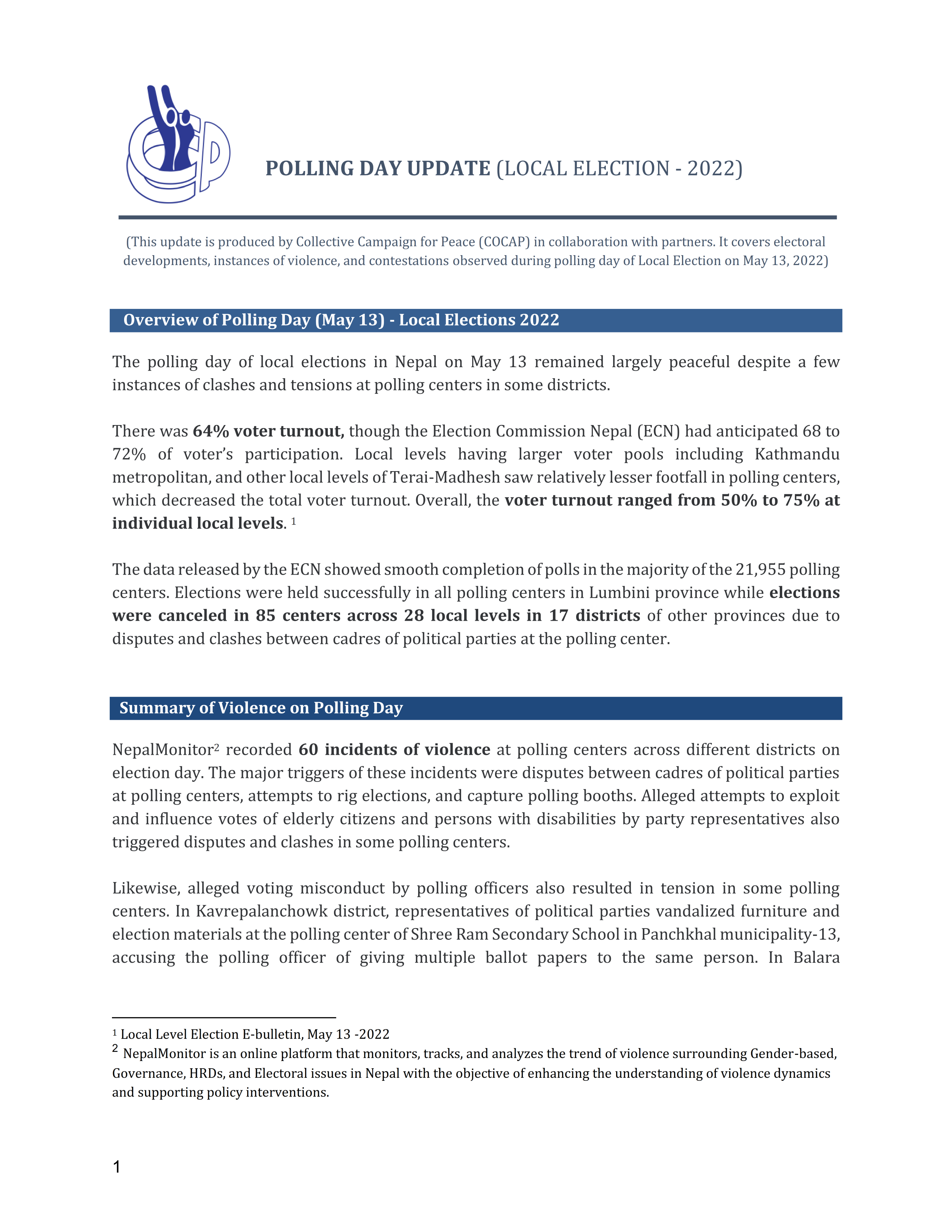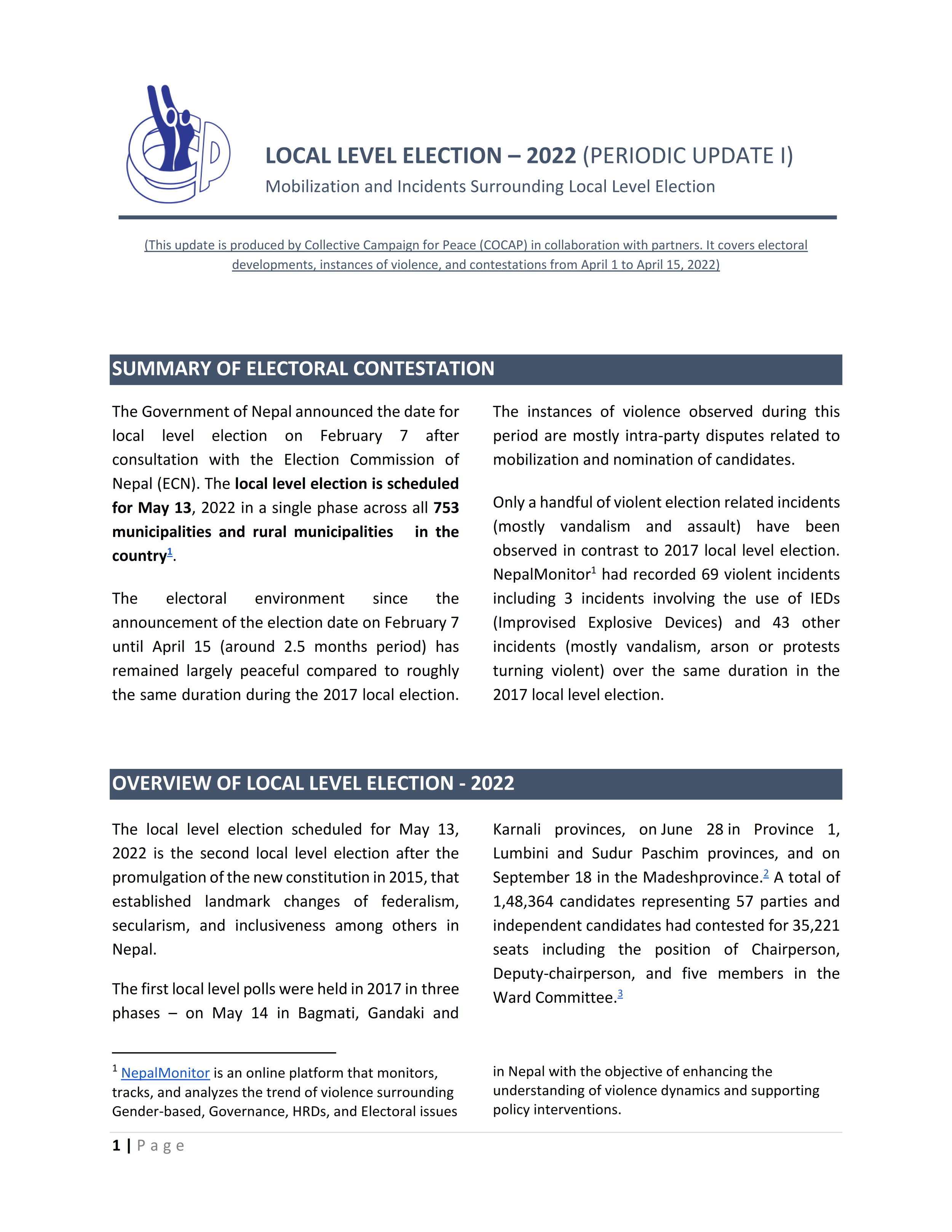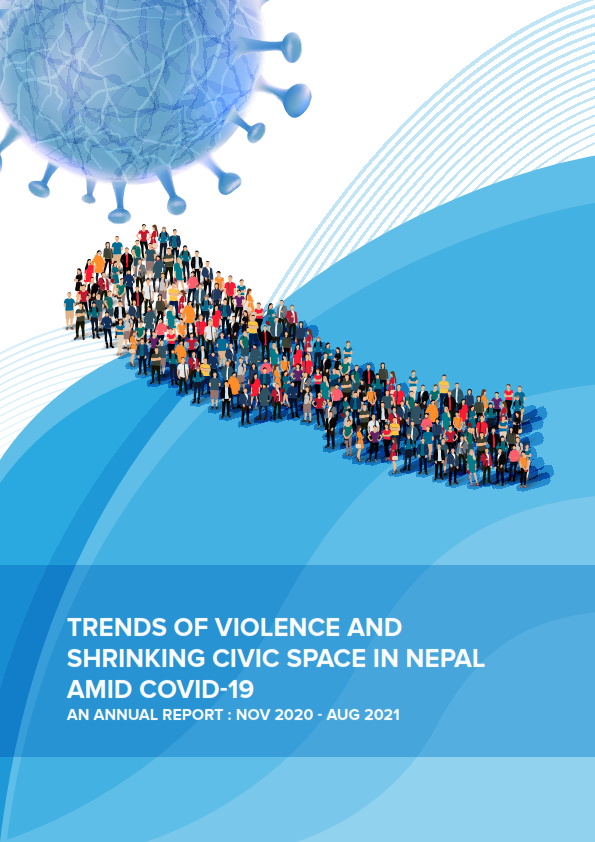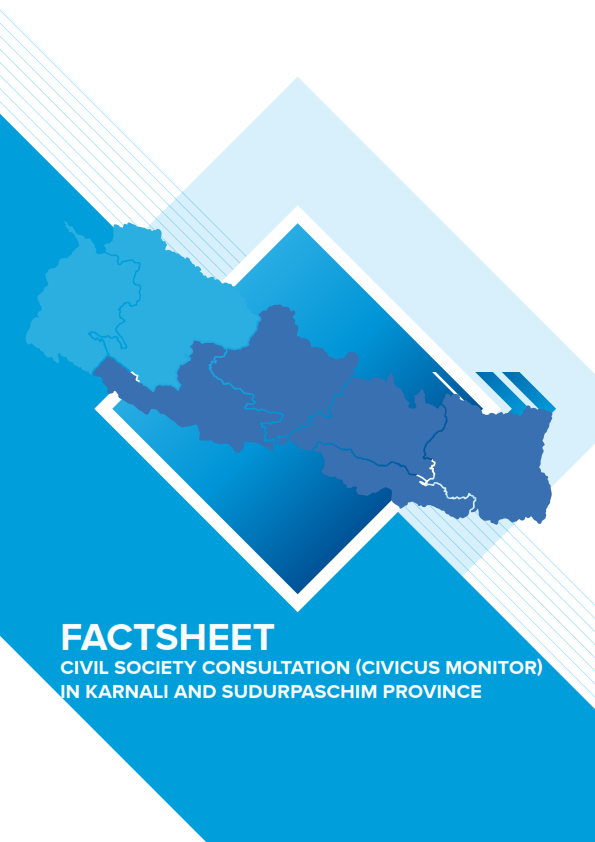Incident Reports
'Cycle of exclusion' - Apoorva Lal's Oped in eKantipur on the issue of Madhes
2015-09-30
Last week, the Constituent Assembly promulgated the Constitution of Nepal (2072). Alongside the issues regarding secularism, federal delineation, proportional representation, and gender equity, the citizenship laws codified in the new constitution and its implications on poverty deserve detailed discussion. Misogynistic law The citizenship laws in Article 11 of the new constitution perpetuate the problem of statelessness and thus fail to address this fundamental hurdle to economic development that bars nearly four million Nepalis from engaging in necessary and everyday affairs such as buying and selling land, sitting for a higher-level examination, accessing financial services, registering to vote, or even acquiring something as basic as mobile phone sim-card. These laws fail to break the poverty-alienation-statelessness trap that is driving much of the anger in the Southern plains.
Articles 11(6) and 11(7) pertain to the conditions which entitle an individual to Nepali citizenship and contain a deeply unjust clause that prevents women from conferring citizenship to their offspring independent of men (ie, a Nepali woman married to a foreigner may not confer her citizenship to her child, while a man married to a foreigner may do so). The repugnance of having such a misogynistic law in a modern-day constitution is bad enough. But this clause has other deeply unjust implications when one considers the effect it will have on the offspring’s basic rights to lead a dignified, productive existence.
Consider this hypothetical situation, a woman from Mahottari marries a man from Madhubani, across the border in Bihar, which is very common in the Madhes. Their child grows up in Mahottari. Yet she is barred from gaining Nepali citizenship through the jus sanguinis (by blood?—?descent) route to Nepali citizenship because of the aforementioned abhorrent law and must apply for ‘naturalised’ citizenship, which places her at the (demonstrably racist) whims of the bureaucracy. It is currently impossible to imagine the proper implementation of jus soli (by soil—?immediate naturalisation by virtue of being born in Nepali territory) because a very small subset of births occur in formal medical institutions and/or are registered formally at the local village/district office, for which, again, the prerequisite is that the parent has a citizenship certificate. So, this child may only apply for naturalised citizenship if she can demonstrate that she lives in Nepal (which is extremely difficult if, as is quite likely, her parents do not own land), and also leaves her being awarded.
Nepali citizenship to ‘federal law’, which is a euphemism for “let the bureaucrats/Chief District Officer decide”. One need not have had much experience with the Nepali state apparatus to recognise that the demographics are heavily stacked against her, and this means that she may well be denied citizenship and thus be rendered stateless. This means that she is now barred from sitting for her 12th-grade exams, open a bank account, purchase land for agriculture or even apply for tenant rights, apply for a passport, register to vote, or even get a sim-card.
This closes the door to not only productive agriculture but human capital accumulation (barred from exams), labour market access (no papers, cannot get a cellphone), access to capital for entrepreneurial activity (no financial access) to mention just a few. This severely stunts her developmental capabilities, and most likely relegates her to severe poverty and eking out a living doing menial jobs/illegal yet extant bonded labour. Suppose she marries a man with an identical background (Nepali mother, stateless/Indian father, denied naturalised citizenship, now stateless). Given their shared statelessness, they are quite likely to be extremely poor. Their child will not just inherit his parents’ statelessness, but also their extreme poverty, and the deeply unjust citizenship laws effectively bar him from exiting this woeful existence.
Now consider this situation repeating itself ad infinitum since social stratification through poverty invariably means that the poorest, who are most likely to be stateless, will marry other very poor individuals. This creates an underclass in Nepal that is not even second-class citizens; they are functionally sub-human because they are deprived of basic human rights that are supposed to be afforded to them by their country. Fight for dignity This is not merely a parable of the intergenerational transmission of poverty but has been happening to thousands of individuals that have been born in the Madhes for generations. This makes many Madhesis de jure outsiders in their own land (not to mention that Panchayat/CPN-UML style Nepali nationalism emphatically ensures that all Madhesis are de facto outsiders in their own land anyway). By an accident of birth, they were born stateless, and deeply backward citizenship laws (in addition to widely prevalent racism) strip them of their dignity by making them outsiders in their own land and relegate them to a life of miserable poverty. And this constitution, touted as one that would give them dignity and justice, perpetuates this horrific injustice and fails to even acknowledge the problem.
Even isolated to this single issue, one can see how this is a deeply repugnant state of affairs. Now put this into the broader social context of inequality, poverty, ethnic discrimination, and racism in Nepal. Imagine the pure unadulterated rage of somebody who was falsely promised that this monumental injustice would be corrected. Kathmandu, meanwhile, mutters incoherently about national unity, geopolitics, and that it is a necessary step to prevent ‘Fijikaran’ (‘Fiji-fiction’, the progressive increase in the political power of ethnic Indians in Fiji—?a fanciful, frankly pathetic notion that poorly masks deeply seated racism and Hill/Khas chauvinism). It further proceeds to send the Army at these protesters and characterises the deaths of nearly 40 people as ‘merely mangoes falling from a tree’. This particular reason may or may not be the reason driving every Madhesi protester on the streets of Birgunj, Janakpur, Jaleshwor, Lahan, or Biratnagar, but either directly experiencing it or witnessing the poverty-alienation-statelessness trap it most certainly drives a large number of them.
There is legitimate grievance borne of years of poverty and discrimination in addition to the experience of racism and alienation that drive many Madhesis on the streets today. To hear this, you must listen, rather than pontificate about how you personally have never harmed a Madhesi and/or that the whole protest movement is ‘an Indian ploy to tear Nepal apart’. Too many of these protesters, their Nepal has never existed; it has merely stood for what they have been deprived of, both legally and emotionally. That they are angry is evidence that they want in, to leave an existence where they are stripped of dignity and relegated a pitiful menial state.
Related Reports
Governance / Kathmandu
Medical education concern committee protest by banging plates and whistling
Governance / Darchula
Workers padlock school citing non-receipt of wages for more than a year
Governance / Sunsari
Prohibitory order issued in Dharan, tightening at entry points
Governance / Morang
Students of Eastern College in Biratnagar on protest
Related Trend Analysis
Analysis

THE NEPAL PEACE MONITOR ANNUAL REVIEW: 2020
October 25, 2021
Human Trafficking / LGBT+ Rights / GBV / Political / Children’s Rights / Senior Citizens’ Rights / HRD Issues / Human Rights / Interpersonal Violence / Governance / Covid-19 / Civic-Space / PwD

_001.png)




